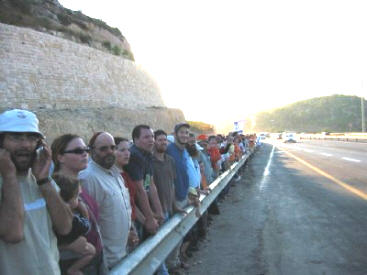|
|
||||
|
|
||||
| Home | Contents | Site Map | Links | Search |

|
|
|
Demonstrators forming a "human chain" on a road south of Ashdod on Sunday as part of a protest against the disengagement plan. (AP)
|
July 25, 2004 - This editorial will make me unpopular with many of my colleagues, but conscience demands that I write it.
About 130,000 demonstrators formed a human chain between the Gush Katif settlement block in Gaza and the Western Wall in Jerusalem's Old City. They gathered to protest Sharon's plan to withdraw from settlements in Gaza.
Here are comments from some demonstrators:
"We came here to protest the program of expelling Jews from their land."
"We are all holding hands to return to the land of Israel."
"The Jewish people have come together to cry out to heaven against the latest attempt to expel us from our land."
"I don't see any difference between the wars of 1948 and 1968 [sic]. In both cases we were attacked by our enemies and those who started the war and lost should pay for it. This is land that is historically ours."
There is a big difference between those two wars. The land Israel won in 1948 constituted its very existence. The land it captured in 1967, with its predominantly Arab population, is a liability.
Ariel Sharon has begun to face this reality. Recent demographic projections predict that by 2020 the population in Israel and the territories it now occupies will reach 6.4 million Jews and 8.5 million Arabs. That would mean a Jewish minority of 43%, growing proportionately smaller, which cannot expect to exercise jurisdiction over an Arab majority indefinitely. Even though Sharon himself was the architect of the settlement plan, he is also a realist who knows that present and future conditions are dictating a change.

|
|
|
A portion of the human chain. (Arutz Sheva)
|
While the majority of the Israeli population appears to favor withdrawal, their wishes are held hostage by a significant and influential minority. Sharon's original plan was rejected by his Likud Party's membership. Sunday's demonstration shows once again that this minority must be reckoned with.
This minority is largely motivated by religious ideology. Its members consider the territories part of Israel, the land of divine promise. It is therefore considered a sin to cede any part of it to strangers. Jewish settlement in all of this land is a divine commandment. What was once Israel must always be Israel.
Ironically, Muslims claim similar entitlement. What was once Dar al-Islam, under Islamic rule, must forever remain so. These two religious claims are grotesque echoes of each other.
I am not a secular Jew. I draw great strength from the Jewish faith. However, I do not claim to know God's timetable, nor when the Messianic age will arrive. It just seems clear that the time is not yet.
To each side, Jew and Muslim, one's own claim seems self-evident while the other's is blasphemy. It is therefore difficult for either side to step outside of itself, observe the situation from a distance, and hear how similar the two really sound.
But that is precisely what needs to happen.

|
|
|
Translation of the banner: "All the land of Israel is ours, because God gave it to us." The small print is from Rashi's commentary on Genesis: God created the land, took it from the seven nations, and gave it to Israel. (Photo: Jacob Richman)
|
The world has suffered enough from religious wars. We cannot afford another one, especially in the heart of the Middle East. The religious settler movement seems inspired by the biblical story of Joshua, whom God commanded to occupy the lands we would now call Greater Israel. The religious settler movement considers the Bible timeless, and God's commandment to Joshua no less binding on us today. It is difficult to question beliefs that may be central to one's faith and deeply cherished, but when the consequences of those beliefs become destructive, we must have the courage to do so. This is true for the Jew as much as for the Muslim. If we who support Israel insist that Muslims reform their religion while we hold on to believing the days of Joshua have returned, then we ourselves deserve a place in the Hypocrisy Department.
The rhetoric of this movement is often extreme. The hard Jewish right frequently accuses Sharon of trying to make the territories Judenrein, "free of Jews," just as Hitler tried to make Europe. Sometimes the comparison between Sharon and Hitler is stated explicitly. This is another ironic and grotesque similarity between the extreme Jewish religious right and its Muslim adversaries, who also never tire of comparing Sharon to Hitler.
If the Jewish religious right continues to frustrate the wishes of the mainstream in Israel, it will lead the country to destruction. Sharon sees this, he sees the demographic threat, the impossibility of Israel's continuing to hold the territories into the indefinite future. Security, not religion, should determine Israel's policy. The anti-withdrawal faction has failed to make a convincing case that civilian settlements in Gaza are necessary for Israel's security. Even Daniel Pipes, an ardent foe of withdrawal, admits that these settlements "might be a tactical and political liability." They do not prevent terrorism. On the contrary, they expose thousands of Israeli settlers to a greater threat of terrorism, and are a burden for Israel to defend.
There is even a moral imperative for Israel not to be in Gaza. The Gaza Strip was a major refuge for Palestinians displaced during the 1948 war. True, the war was of the Arabs' own making, and the attempt to blame Israel for it now is completely bogus. Nevertheless, Jewish settlements in Gaza are an unnecessary provocation. We have Israel. Let the Palestinians have Gaza.
The only qualifier to this moral imperative is security. The chaos now taking place in Gaza, as different Palestinian factions battle one another, means that Israel will have to tread very cautiously in implementing any withdrawal plan. But religion must not add any further complication. Enough blood has already been shed in the name of divine causes.
I have taken some risk in criticizing Israel, which is already the target of much unfair and illegitimate criticism. So lest there be any misunderstanding, let no one conclude that I am drawing any moral equivalence between the Jewish religious right and Islamic extremism. There are surface similarities, as I have pointed out. Each side claims the same land by divine right, and neither has room for members of the other faith living as equals on "its" territory. However, Jews on the religious right mostly confine themselves to nonviolent political expression. They do not blow themselves up to kill as many civilians as possible, do not gun down pregnant women and families as a matter of course, and do not kidnap and behead people while yelling "God is great!" There have been incidents of settler violence, but Israel prosecutes them and its rabbis condemn them. Such incidents are nowhere near as widespread, systematic, or lethal as the violence perpetrated by those who fight Allah's holy war.
Finally, a word about Christian Zionism. For Israel, it is a mixed blessing. Israel needs Christian friends and has precious few of them. But while lending valuable support, Christian Zionists pursue an agenda that would keep Israel vulnerable and exposed in the territories, and that does not truly accept Jews as equals. We must keep this in mind, while thanking our Christian friends for the many good works they have done on Israel's behalf. Critics of the Christian Zionists from within the Christian community, and particularly the liberal Protestant church, have no moral standing. They have betrayed not only Israel but the Jewish people with their egregious double standard, and even at times their evocation of classic anti-Semitism.
If we are truly serving God, then whatever our background, we must find an approach to religion that does not justify the natural tendency of different groups to hate and exclude each other.
Sources:
Anderson, John Ward. "Jewish Settlements, Outposts Expanding Despite Pledges: Growth Most Striking in Gaza Strip, Report Says." Washington Post, July 26, 2004.
Berger, Joseph. "Israelis Form Human Chain to Protest Withdrawal Plan." New York Times, July 25, 2004.
Glickman, Uri. "Human Chain Links Gaza to Jerusalem." Maariv, July 25, 2004.
"´Human Chain´ Connects Gaza to Jerusalem." Arutz Sheva (Israel National News), July 26, 2004.
Pipes, Daniel. "Sharon Loses His Way On Israeli 'Settlements'." New York Sun, February 10, 2004.
Shragai, Nadav. "Protesters Form 'Human Chain' to Protest Pullout." Haaretz, July 25, 2004.
Zakaria, Fareed. "For Sharon, an Unlikely Legacy." Newsweek, July 19, 2004.
Israeli-Palestinian Conflict:
Peace with Realism